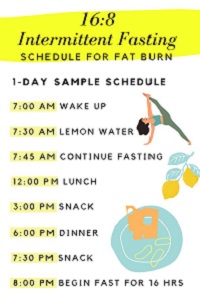Intermittent Fasting ~ What Age Is Best for Man/Woman
Intermittent Fasting ~ What Age Is Best for Man/Woman, Please Watch >>>>>
Some people should steer clear of trying intermittent fasting especially Children and teens under age 18.

In recent years, intermittent fasting has become very popular. It is well-known for promoting weight loss, improving metabolic health, and possibly even extending life.
Given its popularity, several different types/methods of intermittent fasting have been developed. We’ll show you how to practice intermittent fasting.
Table of Contents
What is Intermittent Fasting?
Intermittent fasting is a weight loss diet in which periods of fasting with no food are alternated with periods of normal eating.
It is, in fact, a very deliberate eating pattern. It is a type of scheduled fast, in which you do not eat for a specific period during the day.
Only water, tea, or coffee may be consumed while fasting. Some people fast for several days, while others only fast for a few hours to a day. According to research, intermittent fasting can help with weight loss as well as other health benefits.
Intermittent fasting schedule ~ Intermittent Fasting Plans
Once you have his or her approval, the actual practice is straightforward. You can choose a daily approach that limits daily eating to one six- to eight-hour period per day.
For example, you could try 16/8 fasting, which involves eating for eight hours and fasting for 16.
Benefits of Intermittent Fasting
- Weight loss
- Reduced blood pressure
- Reduced inflammation
- Better outcomes for stroke survivors
- Low cholesterol
- Boosted brain functions
- Protection against cancer
- Lower risk of cardiovascular issues
- Increased longevity
- Better night’s sleep
- Increased cell turnover
- Reduced insulin resistance
Losing weight by intermittent fasting ~ How to Do Intermittent Fasting:
Types of intermittent fasting: 5 Popular Methods
1. The 16/8 Method: Fast for 16 hours each day.
The 16/8 Method entails fasting for 14-16 hours every day. Also, limit your daily “eating window” to 8-10 hours.
You can eat two, three, or more meals within the eating window. This is the Leangains protocol, which was popularised by fitness expert Martin Berkhan.
This method is as simple as skipping breakfast and not eating anything after dinner.
For example, suppose you finish your last meal at 8 p.m. and don’t eat again until noon the next day. Then you’ll be fasting for 16 hours between meals.
Experts generally advise women to fast for only 14-15 hours. Because they appear to perform better with shorter fasts
During the fast, you can drink water, coffee, and other non-caloric beverages. This can help to reduce hunger.
It is critical to consume mostly healthy foods during your eating window. This will not work if you eat a lot of junk food or consume a lot of calories.
- The 5:2 Diet: Fast for 2 days per week.
The 5:2 diet entails eating normally five days a week while keeping calories to 500-600 on two days a week.
This diet, also known as the Fast diet, was popularised by British journalist and doctor Michael Mosley.
On fasting days, experts recommend that women consume 500 calories and men consume 600 calories.
For instance, you could eat normally every day except Mondays and Thursdays.
That is when you consume two small meals (250 calories per meal for women, and 300 for men). As critics correctly point out, no studies have been conducted on the 5:2 diet itself.
However, there have been numerous studies conducted on the benefits of intermittent fasting.
- Eat-Stop-Eat: Fast for 24 hours once or twice a week.
Eat-Stop-Eat entails a 24-hour fast once or twice per week. This method was popularised by fitness expert Brad Pilon and has remained popular for several years.
Fasting from dinner one day to dinner the next equals a 24-hour fast. For example, suppose you finish dinner at 7 p.m. on Monday.
If you don’t eat anything until 7 p.m. the next day, you’ve just completed a full 24-hour fast. Fasting from breakfast to breakfast or lunch to lunch is also an option.
The outcome is the same. During the fast, water, coffee, and other non-caloric beverages are permitted, but no solid food is permitted.
You must eat normally during the eating periods if you are doing this to lose weight. Eat the same amount of food as if you hadn’t fasted at all.
The issue with this method is that many people find it difficult to fast for a full 24-hour period. However, you do not have to go all in right away. Begin with 14-16 hours and then move upwards from there.
4. Spontaneous Meal Skipping: Skip meals when convenient.
To reap some of the benefits, you do not need to follow a structured intermittent fasting plan.
Another option is to simply skip meals on occasion. For example, when you are not hungry or are too busy to cook and eat.
It is a myth that people must eat every few hours or risk going into “starvation mode” and losing muscle.
The human body is well-equipped to withstand prolonged periods of famine, let alone missing one or two meals on occasion.
So, if you’re not hungry one day, skip breakfast and eat a healthy lunch and dinner instead.
If you’re traveling and can’t find anything you want to eat, consider doing a short fast.
Skipping one or two meals when you feel like it is essentially a spontaneous intermittent fast. Just remember to eat healthy foods at all other meal times.
5. The Warrior Diet:
The Warrior Diet entails fasting during the day and eating a large meal at night.
Ori Hofmekler, a fitness expert, popularised the Warrior Diet. It entails eating small amounts of raw fruits and vegetables during the day, followed by a large meal at night.
In essence, you “fast” during the day and “feast” at night within a 4-hour eating window.
One of the first popular “diets” to include a form of intermittent fasting was the Warrior Diet.
My opinion
A 16/8 schedule, in my opinion, is the simplest way to incorporate intermittent fasting into your diet.
This schedule allows you to eat for only 8 hours during the day and requires you to fast for 16 hours. Although 16 hours seems like a long time, half of that time is spent sleeping.
Many people discuss fasting, but few discuss what they eat while fasting. I devised the Intermittent Fasting diet for weight loss listed below.
Nigerian Meal Plan for Weight Loss ~ intermittent fasting Nigerian meal plan example
Meal 1 – Fruit Salad
3 cups fresh organic raspberries, ¼ cup fresh mint leaves, ½ avocado, 1/3 cup raw walnuts, juice of 2 lemons, 1/8 tsp. lemon zest, 1 tbsp. maple syrup
This makes 5 servings
Calories for 1 serving: 159. Fats: 8.2 g, Protein: 2.6 g, Carbs: 21.4 g
Meal 2 – Fruit and Peanut Butter
1 green apple, 2 tbsp. natural peanut butter, 1½ cups peanut butter
Calories: 358. Fats: 16 g, Protein: 9 g, Carbs: 51 g
Meal 3 – Collard Green Wraps
4 large collard leaves, 1 red bell pepper, 1 avocado, 2 to 3 ounces alfalfa sprouts, ½ lime, 1 cup raw pecans, 1 tbsp. tamari, ½ tsp minced garlic, ½ tsp. grated ginger, 1 tsp. extra virgin olive oil
This makes 8 wraps. 1 serving = 2 wraps
Calories for one serving: 293. Fats: 26 g, Protein: 4 g, Carbs: 11 g
Meal 4 – Vegan Sushi
For the sushi – 4 raw nori sheets, 2 cups cauliflower florets, 1 carrot, ½ capsicum, 2 spring onions, ½ avocado, a handful of cilantro, a handful of sunflower sprouts
For the sauce – 2 soaked Medjool dates, 1 tbsp. tahini, thumb-sized ginger, 1 tsp. raw apple cider vinegar, 2 tsp tamari, ¼ cup water, a squeeze of lemon
This makes for about 2 servings
Calories for one serving: 338.5. Fats: 17 g, Protein: 13 g, Carbs: 40 g
Total Intake for the Day: Calories: 1148.5. Fats: 67.2 g, Protein: 28.6 g, Carbs: 123.4 g
Intermittent Fasting For Children, the Elderly, or the Underweight
According to research, intermittent fasting has not been studied in children, the elderly, or the underweight, and may be harmful to all of these groups.
It also suggested that people who fast for more than 24 hours should be monitored by a doctor because changes to the gastrointestinal system or circadian rhythm can occur.
Side Effects of Intermittent Fasting
It is unsustainable.
You can’t tell me anything. Nobody can do some form of intermittent fasting every day of their lives.
You must fast for a specific amount of time while eating a specific number of calories during your eating window.
Low energy, cravings, and the sheer discipline required will make sticking to your fasting period extremely difficult.
Causes low energy levels
Fasting for extended periods, especially when combined with exercise, can deplete your energy to dangerously low levels, lowering your blood sugar levels and leaving you feeling lightheaded, dizzy, and tired.
You might also experience headaches and nausea.
Weight gain is possible.
With the hunger that comes from not eating for so long, you may be tempted to overeat. Vegetables and healthy foods don’t taste so good right now.
Fried and other high-calorie foods will catch your attention. This is where the weight gain starts.
Does intermittent fasting work? How to intermittent fast
Intermittent fasting increased blood pressure, resting heart rate, and other heart-related measurements.
Physical ability
Fasting for 16 hours resulted in fat loss while maintaining muscle mass in young men. Mice fed on alternate days had greater endurance when running.
Are There Any Intermittent Fasting (IF) Rules to Follow?
There aren’t many rules to follow on IF other than sticking to your feeding and fasting times.
However, if you want to see faster results, stick to your recommended calorie intake and consume (as much as possible) healthier foods that are higher in nutrients.
How Do You Practice Intermittent Fasting?
There is no single way to do intermittent fasting. This eating plan has many variations, and the key is to figure out which one works best for you.
“What cultures practice intermittent fasting?”
Some religious practices include intermittent fasting. The Black Fast of Christianity (commonly observed during Lent), Vrata (Hinduism), Ramadan (Islam), Fast Sunday (The Church of Jesus Christ of Latter-day Saints), Jain fasting, and Buddhist fasting are among them.
How can I lose weight fast in Nigeria?
8 Simple Ways to Lose Weight with Nigerian Food
- Eat Less Carbohydrate
- Consume Less Oil
- Oven Bake and Oven Fry (avoid deep frying)
- Avoid High-Calorie Snacks (Fan Yogo, gala, lacasera, chin chin, buns, Puff puff, plantain chips)
- Eat Spicy Foods
- Watch The Salt (Maggi)
- Watch What You Drink
- Choose Meat Wisely
What food is allowed in intermittent fasting?
During the fast, no food is permitted, but water, coffee, tea, and other non-caloric beverages are permitted.
During the fasting period, some forms of intermittent fasting allow for small amounts of low-calorie foods.
Taking supplements while fasting is generally permitted as long as they contain no calories.
What time is 16-hour fasting?
Fasting for 16 hours
This type of intermittent fasting may be beneficial for someone who has tried the 12-hour fast but has not seen any results.
On this fast, people typically finish their evening meal by 8 p.m., skip breakfast the next day, and do not eat again until noon.
Here’s a list of celebs who have found success with intermittent fasting:
- Malaika Arora
- Jacqueline Fernandez
- Lizelle Remo D’Souza
- Alia Bhatt
- Bharti Singh
Which religion does not believe in fasting?
Only Zoroastrianism prohibits fasting among Western religions because it believes that such asceticism will not help the faithful in their fight against evil.
Other Western religions, such as Judaism, Christianity, and Islam, emphasize fasting at specific times
Which Nigerian food is best for weight loss?
- Peppered Goat Meat, or Asun, is another delicious meal that can help with weight loss
- Baked Whole Catfish
- Cauliflower Fufu
- Nigerian Peppered Snails
- Draw Soup (Ogbono Soup)
- Keto Native Jollof Rice
- Nigerian Chicken Stew
- Efo Riro (Spinach Stew)
How can I get a flat stomach in Nigeria?
6 Ways to Lose Excess Belly Fat
- Firstly, increase your protein intake.
- Secondly, limit your carb intake.
- Then, drink plenty of water.
- After that, cut out added sugars.
- Exercise regularly
- Eat breakfast every day.
Summary
I believe we can all agree that intermittent fasting has benefits. From personal experience, it works extremely well for those attempting to lose weight.
However, IF (intermittent fasting) is not the way to build and maintain a fitness lifestyle. It’s simply not sustainable. If you want to practice intermittent fasting, you must exercise extreme caution.
As I previouslhttps://www.pinterest.com/pin/298293175334917884/y stated, it is very easy to develop an eating disorder, so I would recommend that you consult with a doctor and conduct extensive research before making a decision.


